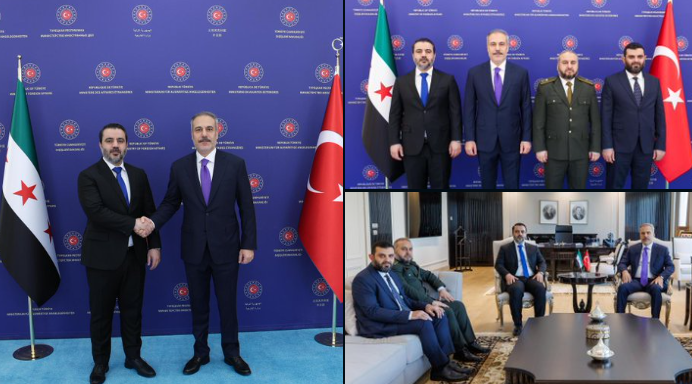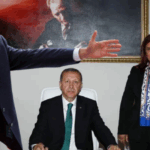Turkey’s foreign minister and his Syrian counterpart on Wednesday issued a joint warning to Israel over what they described as efforts to sow chaos in Syria, while also calling on the Kurdish People’s Protection Units (YPG) to honor its agreement to integrate into the Syrian state and end its role as a regional security threat.
Speaking alongside Syrian Foreign Minister Asaad al-Shibani in Ankara, Hakan Fidan said “certain actors” — namely Israel and the YPG — were “bothered by the positive developments” in Syria following the overthrow of President Bashar al-Assad late last year.
“A new page has been opened in Syria. The years of chaos and tears have ended, and a door of hope has opened for all Syrians and for the region,” Fidan said. “Syrians have begun returning to their homeland at a steady pace. Sanctions are being lifted. Our Syrian brothers and sisters are starting to build relations both with states in the region and with international actors. But we see some players taking steps to undermine this process — from the incidents in Latakia to the YPG’s persistent refusal to integrate into the system. This is a challenge, and it is our duty to define it well and take appropriate measures.”
‘Israel One of the Biggest Actors in This Dark Picture’
Fidan accused Israel of being among “the biggest actors in this dark picture,” saying it appeared to view chaos in Syria as a priority for its own national security. He said Israeli policies not only affect occupied territories but also destabilize neighboring states.
“We warned after the events in Sweida and supported the series of meetings held in Amman to address them. We welcomed the tribes’ efforts to find peaceful solutions. But Israel’s approach — to create crises and problem areas — has led to fresh unrest,” Fidan said. “The unity and territorial integrity of Syria must not be undermined. As we saw in recent months, in the absence of negative external interference, regional cooperation has the potential to heal Syria’s wounds.”
Fidan’s hardline stance on the YPG coincided with reports that Turkey successfully pressured Damascus to cancel planned U.S.- and France-backed negotiations with Kurdish representatives in Paris. The meeting, intended to advance dialogue between Syria’s government and Kurdish authorities in the northeast, was abruptly scrapped after Fidan’s recent trip to Damascus.
According to reports, Ankara framed the Paris format as an “internationalization” of the issue that undermined the March 10 integration framework. Damascus echoed this view and insisted that any such talks be held in Syria, not abroad. Some say the move is part of Turkey’s broader effort to prevent the Kurds from gaining international legitimacy and to keep the integration process strictly under Syrian and Turkish control.
Focus on Kurdish Integration
Turning to the YPG, which leads the U.S.-backed Syrian Democratic Forces (SDF), Fidan accused the group of “playing for time” and refusing to implement the March 10 integration deal with Damascus.
“In this new period, we hear many statements from the YPG/SDF saying, in effect: ‘We don’t interpret the March 10 agreement that way, and the process in Turkey doesn’t concern us.’ Well, what does concern you? Is it making our Kurdish brothers and sisters in the region a tool for Israel? We are starting to see developments we find increasingly difficult to tolerate,” he said.
He noted that YPG members had not left Syria after March 10, instead “waiting for potential crises to maximize their gains.” He warned, “They shouldn’t think we don’t see this.”
Call to Disband Foreign Fighters
Fidan urged the YPG to end its role as a security threat by disbanding foreign fighters it has brought in from Turkey, Iraq, Iran, and Europe.
“My call to the YPG is to immediately cease being a threat to Turkey and the region with the terrorists they have gathered from around the world,” he said. “It is time to abandon the policy of playing for time, to stop mortgaging the future of our Kurdish brothers and sisters, and to think instead about how we can rebuild Syria together. In an environment where Turkey’s security demands are not met, we cannot remain idle.”
Tied to PKK Peace Process
Fidan’s remarks come as Ankara advances a peace process with the outlawed Kurdistan Workers’ Party (PKK), whose jailed leader, Abdullah Öcalan, called in February for the group to disband. On July 11, PKK militants held a symbolic weapons-destruction ceremony in northern Iraq, a gesture Turkey wants all PKK-linked factions — including the YPG — to follow.
Ankara views both the YPG and the SDF as terrorist organizations linked to the PKK, which has fought a decades-long insurgency against the Turkish state.
YPG Rejection of Disarmament Calls
The SDF has rejected Ankara’s demands to disarm, saying Syria’s security realities — particularly the threat posed by Islamic State remnants — require it to maintain its armed forces during the integration process.
“The situation in Syria is really different,” Ilham Ahmed, co-chair of the Autonomous Administration of North and East Syria’s Foreign Relations Committee, told BBC Turkish last month. “Our fight and resistance against ISIL has its own unique nature. These groups still exist and the threat continues. Therefore, we are talking about a process of integration rather than a process of laying down arms.”
Syrian–Turkish Military Cooperation Agreement
On the same day, the Syrian and Turkish defense ministries signed an agreement on joint military cooperation aimed at enhancing the capabilities of the Syrian Arab Army, developing its institutions and structure, and supporting a comprehensive security sector reform process. The deal provides for a regular exchange of military personnel for specialized training designed to improve operational readiness and interoperability. It also outlines the launch of specialized training programs in fields such as counterterrorism, mine clearance, cyber defense, military engineering, logistics, and peacekeeping operations, in line with international best practices. In addition, the agreement allows for the deployment of technical experts to assist in modernizing Syria’s military systems, organizational structures, and command capabilities.
Both governments framed the agreement as part of a broader effort to build Syria’s national institutions on professional foundations that protect state sovereignty, uphold the rule of law, and establish a modern, disciplined, and capable army as a cornerstone of Syria’s security, stability, and territorial integrity. The signing ceremony was attended by Syrian Foreign Minister Asaad al-Shibani, Defense Minister Major General Murhaf Abu Qasra, and Intelligence Chief Hussein Salameh, who were in Ankara for high-level talks with Turkish officials.



